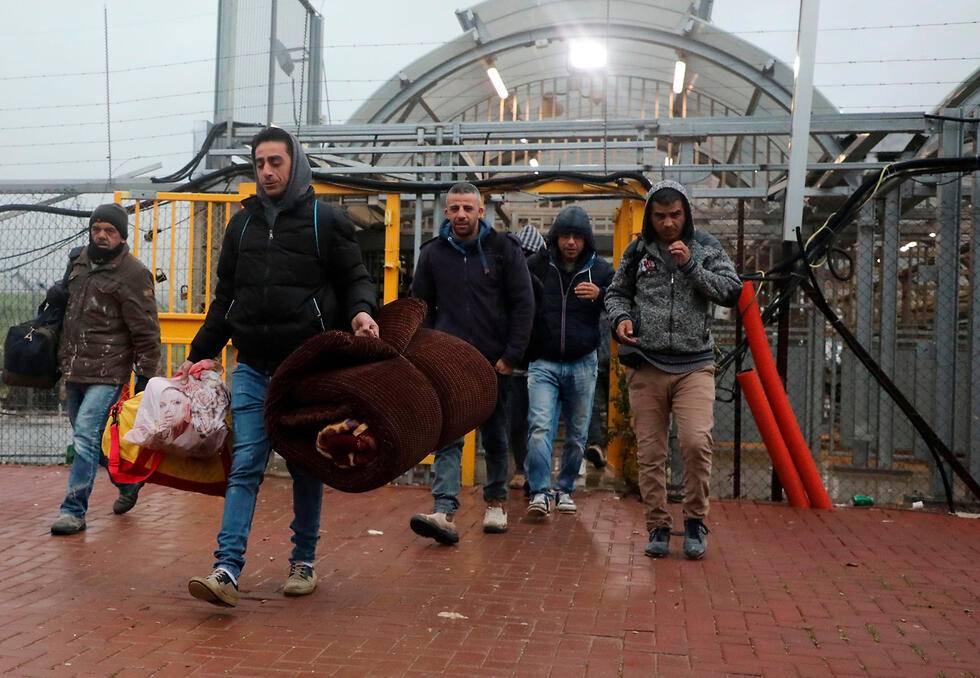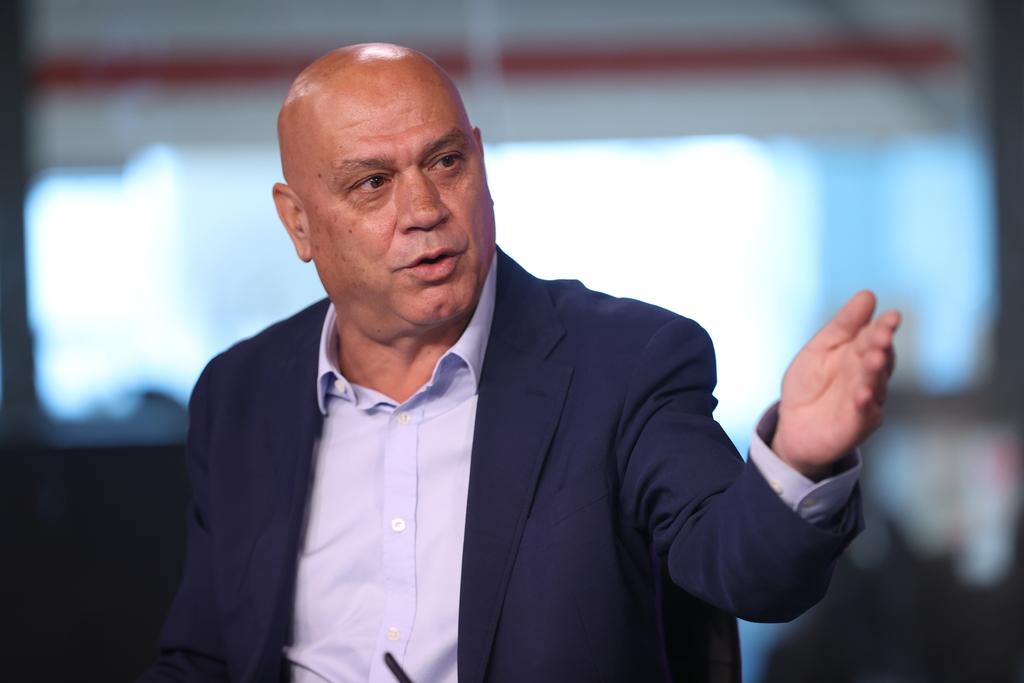Getting your Trinity Audio player ready...
The shopping alleys around Manara Square in Ramallah are full as always, especially at nights when the temperature cools. But the shop owners complain that the customers are mostly window-shopping, rather than actually buying new clothes or electronic devices.
“I work in the government sector, and so does my wife who is a teacher. The rumor has it that our wages might be delayed,” says local resident Nasser Muhammad.
While government employees worry about possible salary delays, many firms in the private sector have been waiting for months and even years for the Palestinian Authority to meet its obligations.
“The private sector had become the main lender to the PA, and now there is simply no more cash. The banks have reached their limits, and the contractors who work with the PA have been waiting to be paid for ages,” says Samih Khalaileh, an economist and businessman.
Three weeks ago, PA Finance Minister Shukri Bishara said during a virtual meeting with international donors that government borrowing from banks “is no longer an option due to the limited liquidity conditions of the Palestinian banking sector.”
Bishara also warned “of a bleak future if finances with Israel are not set straight” and called on the international community to assist the PA in order to avoid a financial collapse. The expected deficit for 2021 is $1.7 billion, up 4.4% from 2020.
“They have paid the salaries [to government employees this month], but I expect that there will be a problem next month,” says Khalaileh.
Over the last decade, international aid to the PA has been cut by more than 50%, and although the number of Palestinian laborers in Israel has grown, the spending on Gaza (35% of the PA budget), the unstable climate and the many limitations set by Israel on the Palestinian economy have fueled an economic crisis that has become especially severe since 2017.
Help your neighbor?
Every Palestinian businessman, economist and government official knows it is impossible to talk about ways to improve or reform the Palestinian economy without involving Israel.
In April 1994, Israeli and Palestinian negotiation teams in Paris signed one of the most important annexes to the Oslo Accords – the Paris Protocol on Economic Relations. This agreement, which initially was intended to be temporary, as were the Oslo Accords were, regulates the complex economic relationship between Israel and the Palestinian Authority.
Israel controls the PA’s borders and its imports and exports. According to the Paris Protocol, the PA must peg its gas prices and value-added tax to that of Israel.
As relations between Israel and PA soured over the years, many Palestinian leaders (including late such as PLO chief Saeb Erekat who died in November 2020), called to disengage from the Israeli economy and withdraw from the Paris Protocol, yet the Palestinian leadership never attempted to implement this step that would officially bury the Oslo Accords.
Today, when the economic crisis in the West Bank is too big to ignore, the new Israeli government is looking for ways to help the PA stabilize the situation.
Esawi Freij, Israel’s regional cooperation minister, is particularly active in this direction: During his first few weeks in office, he ordered the revival of the Joint Economic Committee with the Palestinians (a date for a first meeting has not yet been set) and announced an increase in work permits for Palestinian laborers.
This latter measure must be approved by the Defense Ministry and would allow 16,000 additional Palestinians to work legally in Israel, in construction and hotels. Currently, nearly 87,000 Palestinians are legally employed in Israel, mostly in agriculture and construction, while 35,000 work in the Israeli settlements in the West Bank.
Shortly before the Second Intifada that began in September 2000, 109,000 laborers from the PA (the West Bank and Gaza) were employed in Israel and the settlements.
This step, along with boosting Jordanian exports to the PA, is supposed to be an immediate help to the ailing Palestinian economy, but experts and PA officials do not believe they will be enough to head off the looming crisis.
“It’s important that more Palestinian laborers will have an opportunity to work. However, there are many economic issues that need to be solved between us and Israel: There is the exemption from the accumulated fees for departing travelers (some $225 million, according to the Palestinian Foreign Ministry), reduction of the [3%] commission that Israel takes in return for collecting the Palestinian ‘clearance funds,’ and an increase in transparency for Israeli deductions for services – health, water and electricity,” says Khalaileh.
7 View gallery
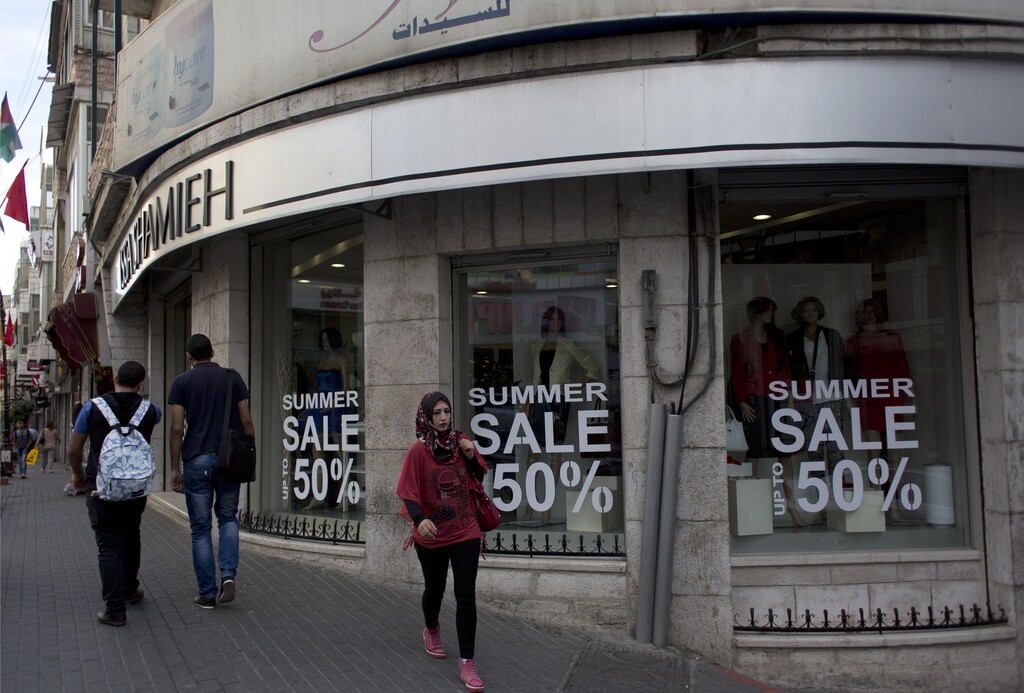

Palestinians walk past a boutique offering discounts in the West Bank city of Ramallah
(Photo: AP)
Under the tax clearance system, Israel collects taxes on behalf of the PA. It is the authority’s largest source of income.
“There is also the issue of e-VAT – moving from a paper-based clearing mechanism to an electronic system that will prevent significant losses to the PA,” Khalaileh adds.
And there are of course a bunch of elephants in the room, first of all Israel freezing the transfer of some $190 million to offset stipends the PA pays to the families of Palestinian prisoners held by Israel and to activists of terror organizations.
Israel’s Security Cabinet approved this step in the beginning of June, in continuation of a policy led by the previous governments since 2019. In the past, Israel tried to transfer these funds to Palestinian banks, but this attempt to find a solution to the crisis was rejected by the PA.
Another elephant in the room is possible Palestinian development in Area C of the West Bank (where the Israeli settlements are located), as mentioned in a statement of Middle East Quartet principles in July 2016.
“Progress in areas of housing, water, energy, communications, agriculture, and natural resources, along with significantly easing Palestinian movement restrictions can be made while respecting Israel’s legitimate security needs,” the statement said.
7 View gallery
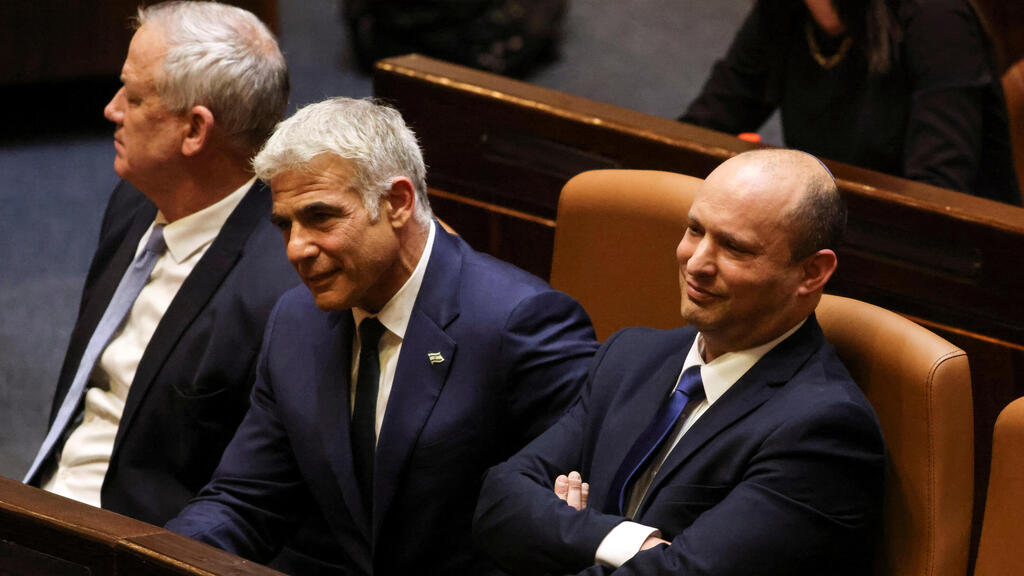

L-R: Defense Minister Benny Gantz, Foreign Minister Yair Lapid and Prime Minister Naftali Bennett in the Knesset
(Photo: Reuters)
Nimrod Novik, a member of the Executive Committee at Commanders for Israel’s Security and a former senior adviser on foreign policy to the late Shimon Peres, says the new Israeli government has taken a very different approach to the PA than its predecessor, but that it can do more.
“In its statements, the Bennett-Lapid-Gantz government indicates a sharp U-turn from [former prime minister Benjamin] Netanyahu’s policies," Novik says.
"After a decade of weakening the PA, it now sets different goals, such as ‘strengthening the PA, weakening Hamas’ and ‘involving the PA in the rebuilding of Gaza,’ all in a frame of ‘minimizing the conflict'," he says.
“In reality, considering the instability on both fronts after years of Netanyahu’s rule, these steps are limited, parsimonious and very distant from the end goal.”
From chronic crisis to burning problem
When both Israelis and Palestinians today criticize the slow pace of Israeli decision-makers vis-à-vis the PA economic crisis, it is easy to forget that until recently no communication existed between Jerusalem and Ramallah. Now some bridges are being established and the communication between the two sides is improving considerably.
7 View gallery
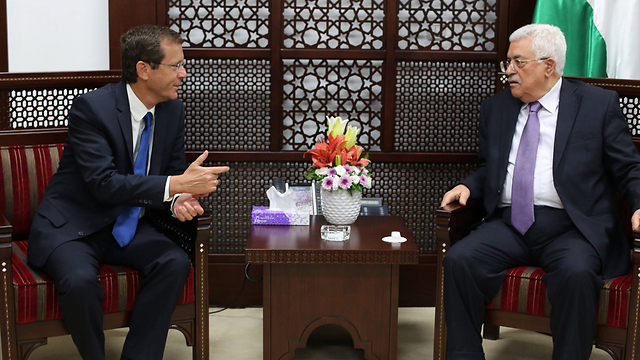

Then-opposition leader Isaac Herzog meeting with Palestinian President Mahmoud Abbas in Ramallah in 2015
(Photo: AFP)
During the last few weeks, Israel’s new president Isaac Herzog spoke with Palestinian President Mahmoud Abbas and a few Israeli ministers met their counterparts on the Palestinian side. Nothing of the kind happened during the last few years.
“Before Esawi Freij the [Regional Cooperation] Ministry wasn’t involved with any of these issues for years. No administrative work or research was done, and we are starting from scratch,” a source in the ministry says.
Given the complex composition of Israel’s new government, it is clear why the radical change of policy vis-à-vis the Palestinians, even if only in the economic sphere, is possible.
The problem is that the clock is ticking fast and the Palestinians are running out of options. The situation in the West Bank has deteriorated significantly during the last few months, following Abbas’ cancellation of elections, the 11-day war in Gaza, the killing of political activist Nizar Banat by PA security personnel near Hebron, and the economic hardship.
7 View gallery
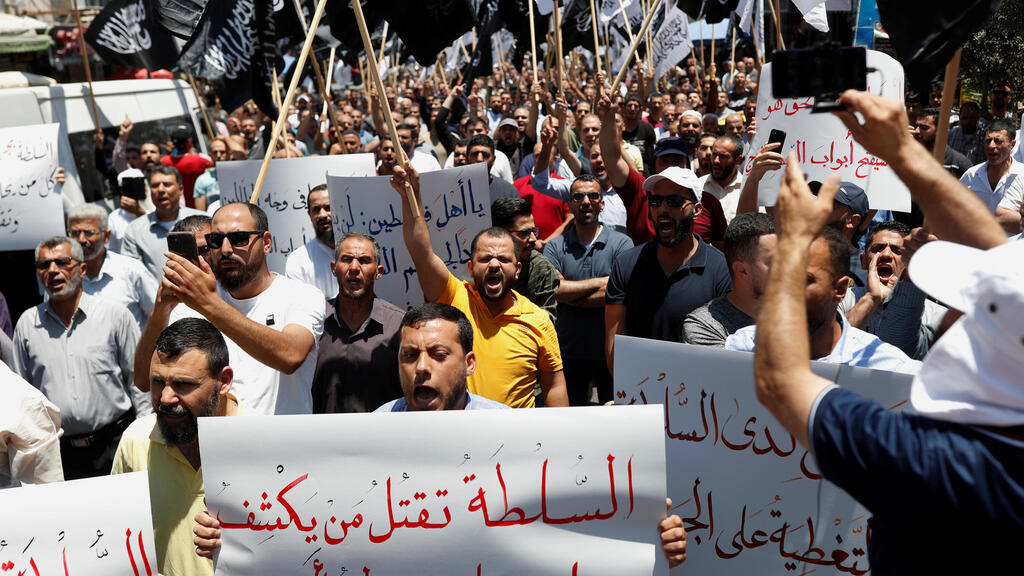

Palestinians protesting in Ramallah following the death of Nizar Ranat in PA custody, June 2021
(Photo: Reuters)
If the economic crisis worsens and the prospect for long-awaited reforms and changes disappears, the PA’s chronic malaise might erupt into internal strife and violence, some of which will inevitably be directed at Israel.
“The PA is continuously getting weaker on many fronts − international, political and economic," says a retired IDF intelligence officer with long experience in Palestinian affairs.
"The economic condition of the PA might force the U.S. and Israel to speed up some supportive financial moves, such as promoting significant infrastructural projects, issuing more working permits for laborers in Israel, renewing external financial aid to the Palestinian budget and more.
“The goal is to establish a broad and stable political base ahead of possible changes in the political leadership in the PA."



